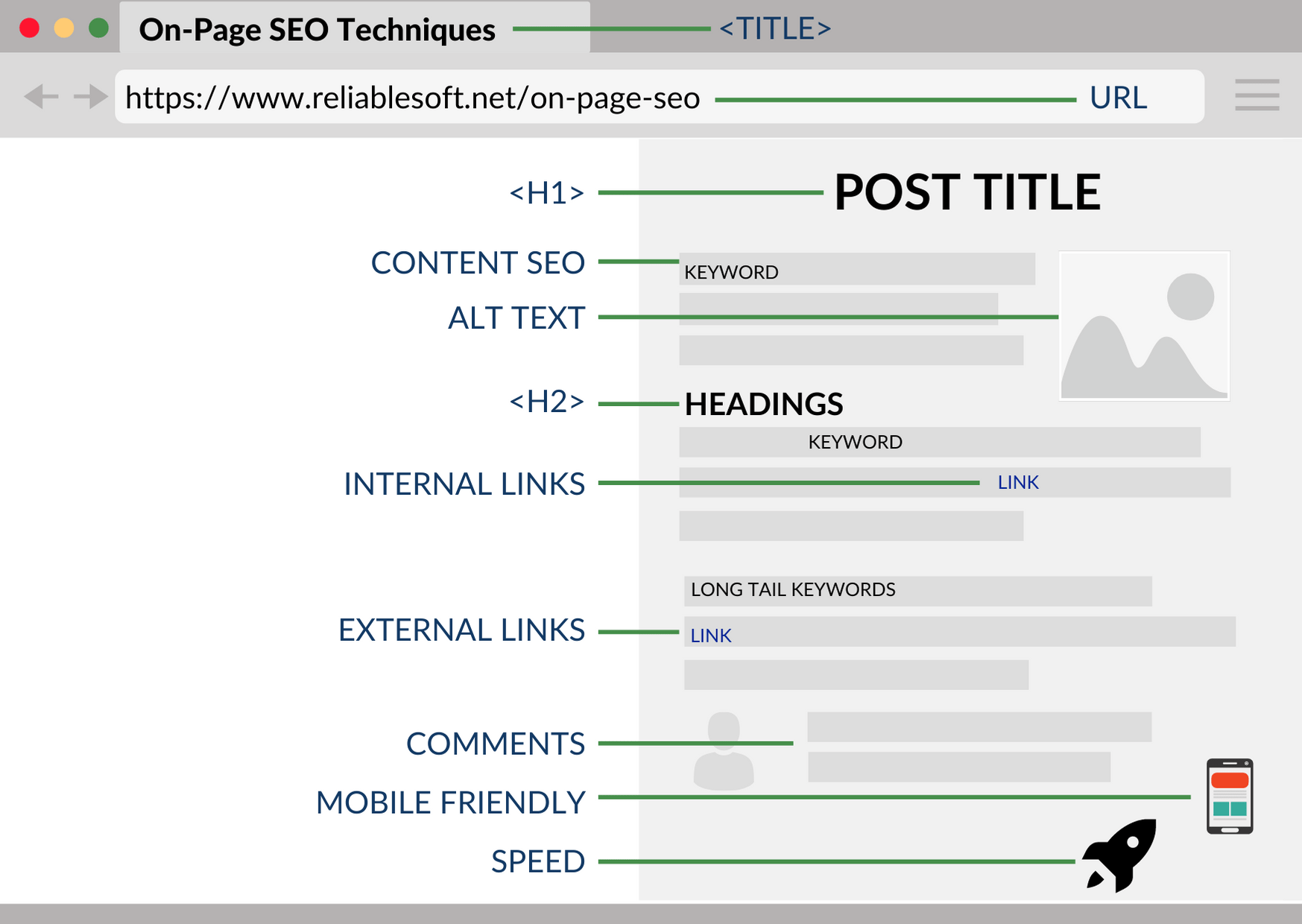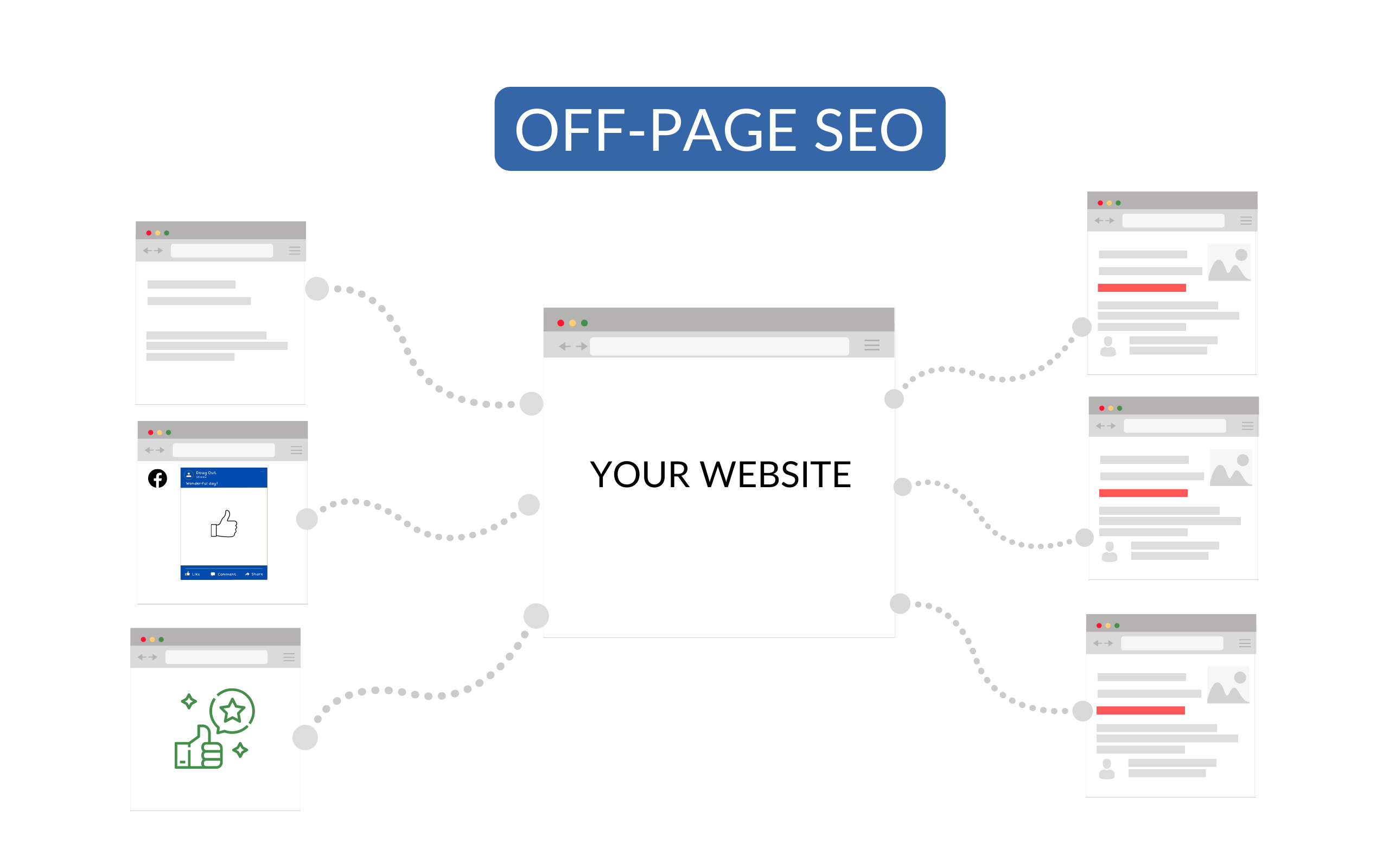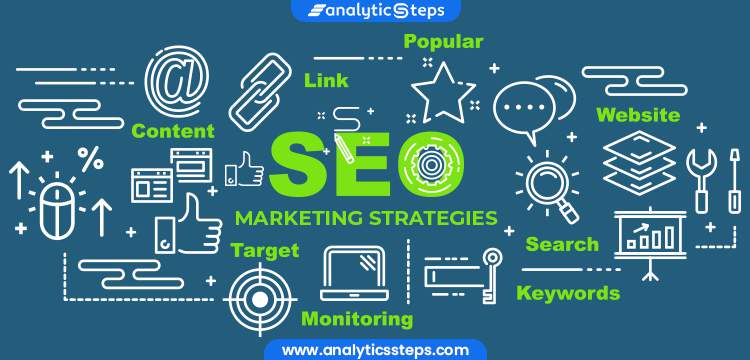[This is a test site and all posts are generated with ChatGPT unless indicated otherwise.]
SEO (Search Engine Optimization) is the practice of improving the visibility and ranking of a website in search engine results pages (SERPs). It involves optimizing various on-page and off-page elements of a website to make it more search engine friendly and relevant to users’ search queries.
SEO is crucial for any online business as it helps to drive traffic, increase visibility, and improve brand credibility. A well-optimized website is more likely to rank higher in SERPs, attracting more visitors and potential customers. SEO is an ongoing process that requires continuous effort and investment but can lead to long-term benefits with the right strategies.
The 4 Major Types of SEO

There are four major types of SEO – on-page SEO, off-page SEO, technical SEO, and local SEO.
- On-page SEO involves optimizing various elements on a website, such as title tags, meta descriptions, and internal linking, to improve its relevance and search engine friendliness.
- Off-page SEO involves optimizing external factors such as backlinks, social media, and online reputation.
- Technical SEO involves optimizing the technical aspects of a website, such as site structure, mobile responsiveness, and site speed.
- Local SEO involves optimizing a website for local search results, such as through Google My Business optimization and local directory listings.
A. On-page SEO
On-page SEO refers to the optimization of individual web pages on a website to improve their ranking in search engine results pages (SERPs) and to attract more relevant traffic. It involves optimizing the content, structure, and HTML elements of a webpage to make it more relevant to users’ search queries and more easily readable by search engines.

On-page SEO techniques
1. Keyword optimization
This involves optimizing the content of a webpage for relevant keywords that users are searching for. Keyword optimization includes finding relevant keywords, using them in the title tag, meta description, header tags, and within the content.
2. Title tags
The title tag is an HTML element that defines the title of a webpage. It should include the main keyword and be descriptive and compelling to users.
3. Meta descriptions
Meta descriptions are short snippets that appear below the title tag in SERPs. They should be compelling and include the main keyword to attract users to click on the link.
4. Header tags
Header tags (H1, H2, H3) are HTML elements that define the headings and subheadings of a webpage. They help to structure the content and make it more easily readable by users and search engines.
5. Internal linking
This involves linking to other relevant pages within the same website. It helps to improve the overall structure of the website and to pass link juice from one page to another.
Benefits of On-page SEO
On-page SEO is important for a number of reasons, including:
- Improved relevance: By optimizing the content and structure of a webpage, it becomes more relevant to users’ search queries, which can lead to higher rankings in SERPs.
- Increased click-through rate: By optimizing the title tags and meta descriptions, they become more compelling to users and can lead to a higher click-through rate.
- Improved user experience: On-page optimization helps to improve the user experience by making the content more easily readable and structured.
Tips for effective On-page SEO
- Conduct keyword research: Use SEO tools like Google Keyword Planner to find relevant keywords that users are searching for and optimize the content accordingly.
- Use descriptive and compelling title tags and meta descriptions.
- Optimize header tags to structure the content and make it more readable.
- Use internal linking to improve the structure of the website and to pass link juice from one page to another.
- Optimize images by using descriptive filenames and alt tags.
- Use schema markup to help search engines understand the content of the webpage.
- Ensure the webpage is mobile responsive and has a fast load time.
B. Off-page SEO
Off-page SEO refers to the optimization of external factors that influence the ranking of a website in search engine results pages (SERPs). It involves optimizing the website’s online reputation, credibility, and authority through external links, social media presence, guest blogging, influencer marketing, and other techniques.

Off-page SEO techniques
1. Link building
This involves obtaining external links from other websites to your website. It helps to establish credibility and authority for your website, which can lead to higher rankings in SERPs.
2. Social media marketing
This involves promoting your website and content on social media platforms to drive traffic and improve visibility. It can also help to improve your online reputation and credibility.
3. Guest blogging
This involves writing blog posts for other websites in exchange for a link back to your website. It can help to establish your authority in your niche and drive traffic to your website.
4. Influencer marketing
This involves collaborating with influencers in your niche to promote your website and content. It can help to increase your visibility and credibility and attract more traffic to your website.
5. Online reputation management
This involves monitoring and managing your online reputation to ensure that your website appears credible and authoritative to users and search engines.
Benefits of Off-page SEO
Off-page SEO is important for a number of reasons, including:
- Improved credibility and authority: Off-page optimization techniques such as link building and online reputation management can help to establish your website as credible and authoritative in your niche.
- Increased visibility: Off-page optimization techniques such as social media marketing and influencer marketing can help to increase your visibility and attract more traffic to your website.
- Improved ranking: By improving your online reputation, credibility, and authority, your website is more likely to rank higher in SERPs.
Tips for effective Off-page SEO
- Create high-quality content: This is the foundation of any effective off-page SEO strategy. Create content that is informative, engaging, and shareable.
- Build high-quality backlinks: Focus on obtaining backlinks from high-quality and relevant websites that have a high domain authority.
- Promote your content on social media: Use social media platforms to promote your content and engage with your audience.
- Collaborate with influencers: Identify influencers in your niche and collaborate with them to promote your website and content.
- Monitor your online reputation: Use tools to monitor your online reputation and respond to any negative feedback or comments promptly.
- Stay up-to-date with industry trends and best practices: Off-page SEO techniques and strategies are constantly evolving, so it’s important to stay up-to-date with the latest trends and best practices.
C. Technical SEO
Technical SEO refers to the process of optimizing a website’s technical elements to improve its visibility and ranking in search engine results pages (SERPs). It involves optimizing the website’s structure, code, and performance to ensure that search engines can crawl and index the site effectively.

Technical SEO Techniques
1. Site structure and navigation
A well-structured website with a clear hierarchy and easy navigation helps search engines to crawl and index your website effectively.
2. Mobile optimization
With more users accessing websites from mobile devices, it’s important to ensure that your website is mobile-friendly and has a responsive design that adapts to different screen sizes.
3. Site speed and performance
A fast-loading website is important for user experience and can also improve your search engine rankings. Techniques such as compressing images, minifying code, and reducing server response time can help to improve site speed and performance.
4. Schema markup
Schema markup is a type of structured data that can be added to a website’s HTML code to provide additional context and information to search engines about the website’s content.
5. HTTPS and SSL
Using HTTPS and SSL (Secure Sockets Layer) encryption helps to secure your website and protect user data, which can also improve your search engine rankings.
Benefits of Technical SEO
Technical SEO is important for a number of reasons, including
- Improved crawlability and indexability: Technical SEO techniques can help search engines to crawl and index your website more effectively, which can improve your search engine rankings.
- Improved user experience: Technical SEO techniques such as site speed optimization and mobile optimization can improve user experience, which can lead to increased engagement and conversions.
- Improved security: Using HTTPS and SSL encryption can help to secure your website and protect user data, which can improve your credibility and authority.
Tips for effective Technical SEO
- Conduct a technical SEO audit: Identify any technical issues that may be hindering your website’s crawlability and indexability.
- Optimize site structure and navigation: Create a clear hierarchy and easy-to-navigate website structure that search engines can crawl and index effectively.
- Optimize site speed and performance: Use tools to identify and fix any performance issues that may be slowing down your website.
- Implement schema markup: Add schema markup to your website’s HTML code to provide additional context and information to search engines about your website’s content.
- Implement HTTPS and SSL encryption: Use HTTPS and SSL encryption to secure your website and protect user data.
- Stay up-to-date with industry trends and best practices: Technical SEO is constantly evolving, so it’s important to stay up-to-date with the latest trends and best practices.
D. Local SEO
Local SEO is the process of optimizing a website to improve its visibility in local search results. It involves optimizing the website’s content, structure, and links to target local search terms and improve its relevance to local searchers.

Local SEO techniques
1. Google My Business optimization
Claiming and optimizing a Google My Business (GMB) listing is one of the most important local SEO techniques. This involves creating and optimizing a GMB listing with accurate business information, including address, phone number, and business hours.
2. Local directory listings
Listing your business on local directories such as Yelp, Yellow Pages, and other niche directories can improve your visibility in local search results.
3. Reviews and ratings
Positive reviews and ratings on platforms like Google, Yelp, and other review sites can improve your local search visibility and credibility.
4. Location-specific keywords
Incorporating location-specific keywords into your website’s content and metadata can help to target local searchers and improve your visibility in local search results.
5. Geotagging and location data
Geotagging your website’s images and using location data in your website’s metadata can improve your visibility in local search results.
Benefits of Local SEO
Local SEO can offer a range of benefits, including:
- Improved visibility in local search results: Optimizing your website for local search terms can help to improve your visibility in local search results, making it easier for potential customers to find your business.
- Increased website traffic and leads: Local SEO can help to drive targeted traffic to your website, increasing the chances of generating leads and conversions.
- Enhanced credibility and authority: A strong local SEO strategy can help to establish your business as a credible and authoritative source in your local market.
- Better user experience: Optimizing your website for local search can improve the user experience for local searchers, making it easier for them to find the information they need about your business.
Tips for Effective Local SEO
- Claim and optimize your Google My Business listing: Ensure that your GMB listing is complete, accurate, and up-to-date, and regularly post updates and photos to keep it fresh.
- Get listed on local directories: List your business on local directories, ensuring that your business information is consistent across all listings.
- Encourage reviews and ratings: Encourage happy customers to leave reviews and ratings on platforms like Google, Yelp, and other review sites.
- Use location-specific keywords: Incorporate location-specific keywords into your website’s content and metadata to improve your relevance to local searchers.
- Geotag your images and use location data: Geotag your website’s images and use location data in your website’s metadata to improve your visibility in local search results.
- Create local content: Create content that is relevant and valuable to your local audience, including blog posts, videos, and other resources that address local topics and issues.
Final Takeaway: Implement the Right SEO Type for Your Website
While each type of SEO has its own unique benefits and techniques, it’s important to incorporate all types of SEO into your overall strategy to achieve the best results. Ignoring one type of SEO could limit your website’s potential for success and make it more difficult to achieve your SEO goals.
Implementing an effective SEO strategy can take time and effort, but the results can be well worth it. By incorporating all types of SEO and staying up-to-date with the latest trends and best practices, you can improve your website’s search engine rankings, drive targeted traffic to your site, and ultimately, grow your business.
As a next step, consider conducting a website audit to identify areas for improvement and develop a comprehensive SEO plan that addresses all aspects of website optimization. With dedication and persistence, you can achieve SEO success and reap the benefits for your business.

